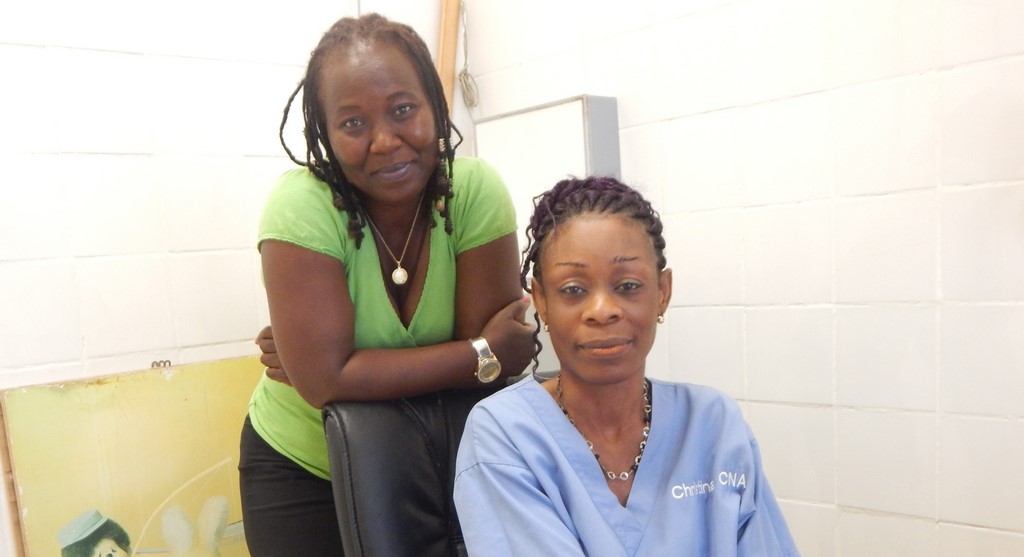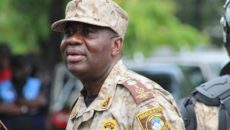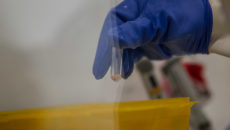MONROVIA, Montserrado – Fanta Kibungu became infected with the Ebola virus while visiting a suspected Ebola patient at the St. Joseph’s Catholic Hospital.
A Ugandan pediatrician at the hospital, Kibungu said she had tried to help a coworker when the transmission occurred.
“While visiting my colleague, I observed that he was helpless and uncomfortable with the inner tube placed into his mouth,†Kibungu explained.
Lax Preventive Measures
Although she was wearing her personal protective equipment or PPE when she entered her colleague’s room, the hospital had not yet put in place all of the necessary preventive measures.
This lapse in enforcing some measures led to Kibungu contracting the virus.
“I tried removing the inner tube from my colleague’s mouth and asked a social worker in his room attending to him and other patients to give me some gloves, but I forgot that she was not a nurse,†she said.
According to Kibungu, the social worker used the contaminated gloves on her hands to provide the gloves that Kibungu had requested.
“That was how I became infected with the Ebola virus.â€
“My colleague died after two days and I fell ill after a week of headaches, running stomach, and vomiting,†Kibungu said.
Isolation and ETU Stay
When she became ill, Kibungu immediately called a doctor working at the hospital and she was told to quarantine herself. She complied and was taken to the Emergency Treatment Unit for a test.
She never got a chance to receive the results because on August 18, 2014, she became so ill that she could not talk. At this point, her neighbors and friends abandoned her in her home, where she stayed with her four-months-old son.

Fanta Kibungu and her son. Photo: Zeze Ballah
As her condition worsened, Kibungu called the ambulance but there was no response. She even sought help from a next door neighbor, who was also a medical doctor.
She said the neighbor, fearing infection, did not come out and asked Kibungu whether she wanted to kill him. She replied “No†as she stood helplessly on his porch with her child in her hands.
“It took an hour before the ambulance arrived and carried me and my child to the Medecins Sans Frontieres ETU at ELWA,†Kibungu said.
At the MSF ETU, doctors asked for her name, residence, identification, and how she became infected before escorting her to a room full of mattresses on the floor.
She said her child stayed three days at the ETU and was later picked up by a catholic priest, whom she did not recognize at the time.
Kibungu spent several days at the ETU and was discharged on August 31.
Depression
When she was taken home, she could not recognize her child when she saw him. She also started asking others around her whether she was alive. Kibungu was now experiencing a state of depression.
Five days after she was discharged from the ETU, Kibungu said a woman from the Ministry of Health was sent to counsel her.
“The lady wanted to give me some medication. I refused because I was very tired from the medication received from the ETU and told her that I will pray to recover,†Kibungu said.
Then, she developed insomnia and spent so many hours awake listening to the radio, so much that she “could not even remember the days of the week.â€
When her child was returned to her care, the stress increased. She had not fully recovered, and nobody was around to help her care for the child.
“Help Me Get a Peace of Mindâ€
After a week of struggling to take care of her child, an American doctor at Kibungu’s hospital sent a lady named Victoria Kesselie to counsel her.
“Victoria came along with another Catholic woman named Magdalene,†Kibungu said.
She said that Kesselie started visiting her four times a week and helped her to start eventually recognizing people and objects.
On Kesselie’s first visit, she asked Kibungu what she wanted.
“The question was a difficult one to answer,†Kibungu said in reflection.
“In response, I told her to help me get a peace of mind,†Kibungu continued.
Contemplating Suicide
According to Kibungu, the stigma from the people in her community made her more uncomfortable than the Ebola sickness.
The Ugandan doctor recalled how nobody wanted to come close to her. Even vendors refused her money when she tried to buy food.
Before she recovered, she dealt with so many psychological problems that at one point, she considered suicide. For her, it would have been a quicker way to die and it would have prevented her from infecting her child.
She had also seen how her colleague died from Ebola in the hospital and was terrified of dying in a similar way.
“Something was always playing on my mind to electrocute myself, saying to me, ‘no ambulance will come to carry you to the ETU, you will not get well, and you are on the verge of dying and if you continue contact with your child, he will also die,’,†Kibungu said.
During this entire time, it did not occur to her at all that she could receive psychological support, as her mind was focused on the despair of her situation.
After leaving the ETU, Kibungu said the problems persisted.
“Patients leaving the ETU do not understand that the Ebola virus disease has a lot of psychological problems with them.â€
She said depression was a common complication that came with the disease. Because it was so easy to transmit the virus, people naturally avoided recovered Ebola patients, often making them feel isolated in society.
However, Kesselie’s constant visits to her house helped break the barrier of discrimination in her community.
“People that avoided me started to come around after they saw Victoria visiting me constantly,†she said.
After four months of regular counseling, Kibungu said she regained her state of mind. Further, the counseling was particularly helpful in making her feel human and a part of the society.
Psychological Support Not Only for the Mentally Ill
A Liberian trained in Kenya, Kesselie avoids referring to recovered Ebola patients as survivors, as is often used in the media. Instead, she refers to them as heroes.
“These heroes have their stories to tell but when people start to call them survivors, they will be regarded as people with less dignity in the society with such disorder being in them,†she said.

Victoria Kesselie, Psychologist. Photo: Zeze Ballah
Kesselie said the period of the Ebola outbreak in Liberia necessitated practices that were not normal in society over an extended period.
Health workers seemed less empathetic as they were wearing their PPEs and could not touch people with their bare hands. Eye contact was also difficult to maintain as health workers were often behind masks.
“Looking at the entire situation during the Ebola crisis,†Kesselie said. “I knew that there was something beyond treating people in the ETU.â€
She said the recovered patients “needed psychological or emotional support to get them back to their right state of mind after being discharged from the ETU.â€
Kesselie said her clients needed a professional to listen to their stories help them cope with the situation. However, many did not initially know of the importance of psychological support.
A lot of Liberians view psychological support as something reserved for mentally ill people, so she had to make them aware of the benefits of counseling.
One of the first steps Kesselie took during her counseling sessions was to help clients understand that family members, friends and loved ones that did not visit them at the ETU centers were doing so out of concern for their safety and did not hate them. That usually reduced the level of anger in her clients and made them less anti-social.
Kesselie said that confidentiality was another key concept she needed to introduce to her clients because “if such story is let out, the person feels bitter, nasty and disappointed in you.â€
In a close-knit society like Liberia, confidentiality becomes even more necessary.
“More Could Have Survived Ebola with Psychological Supportâ€
Kesselie did not only counsel recovered patients, but she also provided help to individuals who lost family members as a result of and during the crisis.
Flomo Kolubah Stevens, the Assistant Dean of Student Activities and Organization at the University of Liberia, was another client of Victoria. His oldest brother who came to Liberia on a vacation during the Ebola crisis fell ill and met his untimely demise. He had been serving as a United Nations volunteer in Darfur, Sudan.
“My brother was close to my heart, and his death was something that I could not get over as he was considered the [bread winner] for the entire family,†Stevens said.

Flomo Stevens, a former patient of Kesselie. Photo: Zeze Ballah
After his brother’s death on August 17, 2014, he tried calling the ambulance but received no response. “The dead body was left unattended in the house for three days,†Stevens said.
He had to call his brother’s office, and co-workers were able to test the body to determine that he did not die from Ebola.
Stevens said he was only able to cope with the grief when he started receiving counseling from Kesselie. At that point, she had just returned from Kenya and was lodging with his family. Kesselie’s presence in the home was a blessing, as Stevens would experience more tragedy.
“After my brother’s bereavement, his wife also died on September 2, 2014, and that became the most frustrating moment in my life at the time,†Stevens said.
At that moment, his neighbors assumed that Stevens’ family were all infected with Ebola. Fortunately, tests showed that his sister-in-law also did not die from the deadly virus.
Although hesitant at first to counsel Stevens because he was close to her, Kesselie eventually did.
Stevens admitted to going through depression, which he said started in September. “The counseling continued for 3 months,†he said. He attributes his recovery and being able to cope with the situation to Kesselie.
Stevens said he thought many people could have survived the Ebola virus if they had such psychological support, stressing “not everyone that died during the Ebola crisis died from the virus but from stress, depression among others.â€
Psychological First Aid Training
During the Ebola crisis, Kesselie did not only counsel patients; she also trained over one thousand persons to administer psychological first aid in Grand Cape Mount, Bomi, and Montserrado. Similar to regular first aid, psychological first aid is meant to assist victims immediately after an emergency or disaster.
One of such trainees was Juah Nineme, who came across Kesselie in January 2015 at Action Contre La Faim in Bomi County.
“We were 23 psychosocial [counselors] including two social workers trained to also administer psychological first aid…†Nineme said of her training.
She said the training they received went a long way as they in turn taught others in Grand Cape Mount and Bomi Counties.
In order to deal with stigmatization of recovered patients in their communities, Nineme and others trained psychological first aid staff not only counseled patients but also held focus group discussions in communities to help them “understand that [the recovered patients] are their brothers and sisters and they should be accepted in the communities.â€
Since her work during the height of Ebola, Kesselie now serves as an educational psychologist and lecturer at the Cuttington Graduate School of Education in Monrovia.
She is also a facilitator of the senior management team of the Liberia National Police.
The Ebola outbreak entered Liberia from neighboring Guinea and killed over 4,000 Liberians. The World Health Organization on two successive occasions declared Liberia free from the deadly virus that ravaged Guinea, Liberia and Sierra Leone.
Featured photo by Zeze Ballah



